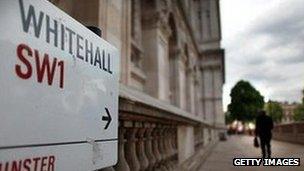Civil service: MPs warn of risk of 'pay exodus'
- Published

Ministers have said the civil service needs to become more agile and commercially-minded
The Civil Service faces an exodus of its most "talented and marketable" staff because of growing unhappiness with their pay, a new report claims.
The National Audit Office said senior civil servants were 17% worse off, in real terms, than in 2009 after a two-year pay freeze and other changes.
The spending watchdog warned of salary discrepancies between departments and between "lifers" and external recruits.
Changes were introduced in April to give more flexibility in pay awards.
Caps on bonuses have been lifted so departments can reward their best performers while 100 senior mandarins in important strategic roles overseeing major projects will be eligible for a "pivotal role allowance".
'Financially unattractive'
The NAO said satisfaction across the upper echelons of the civil service had fallen markedly in the past four years, thanks to a two-year pay freeze and changes to pensions and other benefits.
While turnover was currently low, it warned that one in five of the 3,600 top figures in the service could leave within the next year and and there was evidence that senior roles were coming to be seen as "financially unattractive".
It said recruits from the private sector and elsewhere earned 24% more, on average, than those who had worked their way up the civil service ladder while there were discrepancies between those promoted before the pay freeze and others.
Another issue it highlighted was the fact jobs within the same grade carried varying salaries across different departments
In line with the rest of the public sector, the pay freeze across Whitehall has been relaxed slightly this year and departments have been given flexibility in how to distribute pay rises provided the average increase is not more than 1%.
The starting salary for deputy directors has been raised from £58,200 to £60,000.
Unlimited "pivotal allowances" could be paid in future to key individuals although they will be subject to approval by the Treasury and the Cabinet Office while the Treasury will need to sanction bonus payments of more than £17,500.
Skills shortage
However, the NAO warned these changes might not be enough to retain and attract the desired calibre of officials.
"There is a risk that economic recovery could see an exodus of the most talented and marketable senior people, at the very time when effective corporate leadership is needed to meet the challenges of the remainder of the Parliament," it said.
The watchdog said there were still "significant" skills shortages at the upper level of the civil service, particularly in areas such as commerce, project management, digital delivery and change leadership.
In April, the government launched a five-year plan aimed at improving skills and performance across the Civil Service, introducing a common approach to recruitment, promotion, and performance management.
It is expected to announce further changes to the structure of the civil service next month although it has reportedly backed down over plans to give ministers the final say over appointing the most senior civil servants in their departments.
A Cabinet Office spokesman said: "The Civil Service is delivering an ambitious reform programme, whilst retaining and developing our talent in very challenging times.
"We are therefore pleased the NAO recognises the progress we have made in strengthening leadership across departmental boundaries."
- Published5 February 2013
- Published28 February 2013
- Published1 February 2013
- Published19 June 2012